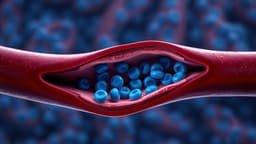Home / Health / New Pill Slashes Bad Cholesterol by 60%
New Pill Slashes Bad Cholesterol by 60%
22 Nov
Summary
- A new daily pill, Enlicitide, significantly reduced LDL cholesterol.
- The drug showed a 60% reduction in 'bad' cholesterol levels.
- It offers a potential oral alternative to injections for HeFH patients.

A new once-daily pill, Enlicitide, has shown exceptional promise in reducing high cholesterol levels. Developed by Merck, the drug was found to lower LDL cholesterol by an average of 58% in a global clinical trial, with the reduction reaching nearly 60%. This significant decrease in 'bad' cholesterol occurred in participants with heterozygous familial hypercholesterolemia (HeFH), a genetic condition that elevates heart disease risk.
The study, published in JAMA, involved 303 adults across 59 medical sites in 17 countries. Participants were already on other lipid-lowering therapies but still had elevated cholesterol. Enlicitide provided a substantial improvement, maintaining an average 55% reduction after 52 weeks. Other harmful fats like non-HDL cholesterol and apolipoprotein B also saw significant drops.
This daily oral pill presents a potentially simpler alternative to current PCSK9-blocking drugs, which require periodic injections. While the results are encouraging, further large-scale outcome studies are needed to confirm its efficacy in preventing heart attacks and strokes, and to assess long-term safety. The trial also focused solely on HeFH patients already on treatment.



